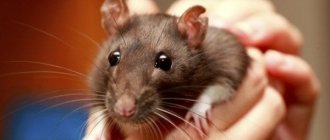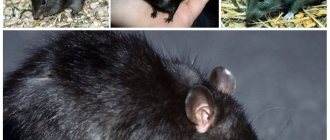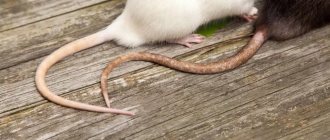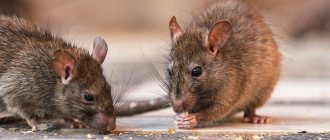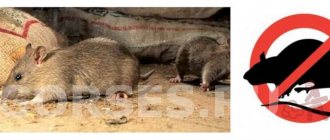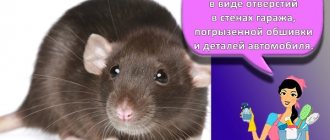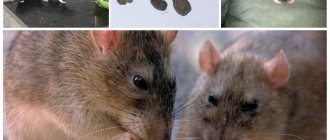Behavioral features
Rats detect any changes in the owner's voice, so raising your voice or using brute force for punishment is not acceptable. A frightened animal will become downtrodden and wild.
Try turning the guilty rodent onto its back. In nature, such punishment is used by the leader of the pack, so the rat realizes guilt and is filled with respect.
The only punishment for a rodent is to turn it over into a subordinate position
With a good attitude, the pet becomes imbued with love and begins to show talkativeness (coos, chirps, grunts). But even in this case, all sounds have their own interpretation and contain an obligatory subtext.
What sounds indicate health problems?
“Pigeon” cooing occurs with various diseases of the respiratory system (colds, rhinitis, runny nose), less often with cardiac dysfunction. The animal needs a veterinary examination and selection of comprehensive treatment.
Grunting sounds can be a sign of a deviated nasal septum, rhinitis, or even pneumonia. But don’t be alarmed in advance—in some cases, the rat may grunt with pleasure. For example, receiving a desired treat or affection from a person.
What sounds do domestic and wild rats make?
Under natural conditions, rodents live in colonies and communicate in three complementary ways:
- High frequency sounds. Used by cubs to find their mother or by males during the mating season. The human ear is not able to recognize this signal.
- Chirping. Rapid rhythmic chattering of teeth is used to warn relatives of approaching danger. A domestic rat can also chirp if it is scared.
- Smells. They play a key role, since the rat’s sense of smell is more developed than other senses. Wild animals mark their territory with scent glands, and also recognize relatives by a specific smell.
Reference! Rats are myopic, so visual perception does not play a key role for them.
As they became domesticated, people learned to distinguish and identify some of the sounds of their pets.
Hiss
Just like cats, in moments of anger and irritation, rats bristle and hiss. In this case, it is better not to disturb them. If there are several other rodents living in the cage with the aggressor, carefully separate him from the others and leave him alone until he “cools off.”
Squeak
With the help of a piercing loud squeak, the animal tries to convey its fear or pain. Inspect the area around the cage and analyze what might have frightened your pet. It is likely that the rat could hear the cat or the hum of the vacuum cleaner from the next room.
If the rat does not live alone in the cage, put it away. Inspect carefully for bites and injuries. If there are no visible signs of damage on the body, and the pet does not calm down and continues to squeak for a long time, contact your veterinarian immediately. Your pet may experience severe pain due to internal injuries.
A quiet, barely audible squeak from stroking means that the rodent enjoys communicating with the owner.
An abrupt loud squeak when pulled out of the cage signals that the pet is not in the mood to contact a person.
Whistling
A long whistling sound in the throat is an attempt to attract the attention of the owner, a desire to receive affection.
The increasingly loud whistle is a mating call that helps males attract females for mating.
Chirping
Chirping, just like squealing or squeaking, is a sign that your pet is scared. The owner must examine the area around the cage to identify the threat and eliminate it. The rodent may also chirp when in pain.
Screech
A loud squeal or scream as if it is being killed is also called a rat's "cry." It indicates severe pain or fear of the rodent.
As in the case of squeaking, it is necessary to palpate the pet’s body. If, when you touch any place without visible external injuries, the animal begins to scream, you must take it to the veterinarian. Pain can be caused by internal injuries to the digestive tract as a result of feeding foods that are unsuitable for the rodent.
If you find any kind of injury in a rat (skid, cut), you need to provide it with first aid yourself: treat the wound with an antiseptic solution and stop the bleeding.
Grinding teeth
Sometimes rat owners are frightened by the strange sounds that their tailed pets make. Among them, for example, grinding teeth. In fact, this sound is similar to a cat purring. The creaking resonates in the body of rodents, and because of this it seems that the animal is trembling.
The tailed pet grinds its teeth when it is as calm, satisfied and full as possible.
Grunt
The rat often makes sounds that are similar to grunting from pleasure when communicating with the owner or receiving a favorite treat from him. However, grunting sounds for these rodents are not the norm, since they most often occur if the animal has rhinitis, pneumonia, heart problems or a deviated nasal septum.
If such a condition appears, it is better to show your pet to a veterinarian and make sure that his life is not in danger.
Important! Grunting sounds combined with shortness of breath, whistling, convulsions, blanching of the ears, blueness of the tip of the tail and paws are produced by dying rats. In this case, the animal needs to be given first aid - give a few drops of Corvalol, and then take it to the doctor.
Cough and sneeze
Cold symptoms in rodents and humans are very similar. The disease is manifested by coughing, sneezing, lacrimation, runny nose and apathy. When the first signs of respiratory diseases appear, your tailed pet should be shown to a veterinarian, since such diseases in rats develop very quickly and often cause death.
Sometimes healthy animals make sounds that vaguely resemble sneezing or coughing. They usually do this to intimidate their cagemates and to assume a leadership role.
Hoarse screech
Expresses aggression and is used when sorting out relationships with cagemates.
IMPORTANT! If the pet lives alone, then squealing signals a bad mood. Touching the animal at this moment is dangerous.
Coughing
The appearance of cough in rodents does not always signal illness. This sound is accompanied by anger and a demonstration of leadership.
High-pitched squeak
The animal experiences severe fear or pain.
IMPORTANT! If there are no obvious injuries, contact a veterinarian immediately. Internal damage is not always amenable to self-diagnosis.
Whistle in the ultrasonic range
With the help of a whistling sound in the throat, the pet demonstrates the desire to sit in the owner's arms. When the volume increases, the animal is not inclined to caress. Also, this frequency helps to establish contact with females.
Reasons why a rat may be choking or panting?
Attention! Due to the rapid metabolism of the decorative rat, diseases progress very quickly. It is impossible to identify them, much less cure them at home. Therefore, in case of any deviations in the breathing process, you must contact a veterinarian or, even better, a ratologist.
If extraneous sounds are heard during breathing (wheezing, whistling, etc.), it becomes confused or the animal is suffocating, this may be the cause of various diseases.
Respiratory diseases (bronchitis, pneumonia, asthma)
A rat's heavy breathing is a bad sign.
Sometimes even a common cold can cause more serious illnesses, resulting in death. For respiratory diseases, the following symptoms are distinguished:
— the rat constantly grunts and sneezes;
— dried brownish mucus appears on the nose and eyes, it is called porphyrin;
- a characteristic whistle is heard, the animal breathes frequently and unnaturally from its sides;
- there is a cough of varying intensity and humidity, wheezing and gurgling are heard when breathing, the rat opens its mouth;
- in neglected situations, the rat characteristically hunches its back, moves little and often sleeps;
- in severe cases of the disease, the rodent refuses to eat, apathy, ruffled fur, and mucous discharge from the eyes and nose are observed.
Have you noticed similar signs in your rodent?
Cardiovascular diseases (heart failure, heart attack, stroke)
Heart failure can occur in any rat, regardless of age. This disease also causes striking symptoms:
Is the rat grunting? Let's run to the vet!
— the animal gains weight sharply, a huge belly appears;
- sometimes the opposite situation occurs: the rodent quickly loses weight, the fur becomes dull and disheveled;
— the domestic rat loses activity, becomes easily fatigued, and the animal sleeps a lot;
— breathing becomes wet and heavy, the rodent grunts, wheezes and coughs;
- the tips of the animal’s tail and fingers become cold and blue, the hind legs are weakened.
Older, older rats may have a heart attack or stroke.
These diseases are characterized by the following symptoms:
- the animal falls on its side and convulses;
— the rodent opens its mouth and gasps;
- limbs move involuntarily.
Note: Cardiovascular and respiratory diseases may present with similar symptoms, but the treatment required is completely different. Therefore, it is impossible to diagnose and treat an animal on your own, without the help of a specialist.
If a rat is breathing heavily, this is not normal!
Can pet rats hiccup?
Hiccups in an animal occur against the background of:
- overeating;
- nervous excitement;
- hypothermia;
- helminthic infestation.
If the case of hiccups is isolated, then there is no need to worry - perhaps the rat has simply eaten too much. If attacks of hiccups occur periodically, then you need to think about changing food and carrying out preventive deworming.
Important! When hiccups are accompanied by heavy, wheezing breathing, take your pet to the vet immediately. There is a high risk of pneumonia or pneumonia. Without proper treatment, this can lead to the death of your pet.
The rat makes strange noises: what should I do?
Sounds that are unusual for humans are not always something unnatural. Sometimes a rat tries to attract attention, get a treat, or announce danger in this way. Guided by the description of each sound, you can easily understand what your pet is trying to say.
If you suspect that the animal is unwell and needs medical attention, do not delay visiting the veterinarian.
It’s not difficult to learn to feel your pet’s mood if you give him a couple of hours of free time every day. Follow the habits of the rat, try to understand the logic of its actions. Then you will easily understand the sounds that the rat makes and what it is trying to communicate to you in this way.
Can a rat scream?
A heart-rending squeal, scream, or, as it is also called, “crying” of a rat is a sign that the animal is very scared or in pain.
If there are no objective reasons for panic, and the pet continues to scream, carefully remove it from the cage and feel its body with your finger. As a rule, when a person touches a sore spot, the rodent begins to scream louder.
Note! In some cases, a rat may experience pain due to internal injuries to the esophagus after eating inappropriate foods.
How to decipher a rat squeak
Despite the variety of sound signals produced by tailed rodents, most often these animals express their feelings and mood with the help of squeaks. You can guess what this pet signal means by listening to how and with what intonation the rats squeak:
- if a rat squeaks when you pet it
, then perhaps it has a wound on its body, touching which gives it pain; - the animal's quiet squeaking from stroking or licking hands
can also mean that the pet is experiencing pleasure and joy from communicating with the owner;
- sometimes domestic rats, especially young rats, squeak and express approval and delight at watching the games
and fuss of their tailed brothers; - The animal's squeak also indicates that it is frightened. For example, with a loud, abrupt squeak,
a rodent notifies its owner that a cat has approached his cage and he needs protection; - if a rat squeaks when you pick it up
, then it is likely that the animal is not in the mood to play and communicate at that moment, and thus the pet expresses dissatisfaction with being disturbed.
Learning to understand rat “language” is not difficult. To do this, you just need to give the cute animal enough attention and care, because then the owner will easily understand what the little pet wants to tell him.
Previous Features and habits of ratsSkeleton and anatomy of a rat, internal structure and location of organs Next Features and habits of ratsWhat is the difference between a mouse and a rat (photo) - comparison table
Causes of laughter in rats
Just like humans, rats react to tickling. This is due to neurons that have been identified in the brain of rats; they are responsible for the reaction to tickling in the form of laughter. Like in humans, they are located in the frontal lobes, which are responsible for mood (thanks to these same zones, the animal senses its body in space).
By tickling the paw (similar to a human foot), belly or behind the ears, you can make the animal smile or laugh. The animal gets pleasure and makes sounds that are very reminiscent of a person’s fervent laughter, and a satisfied grimace appears on its face.
To provoke laughter, you need to gently tickle:
- paws
- abdomen
- behind the ear
- withers
As evidence that rats experience positive emotions, the following is noted: after being tickled, the animal reaches out again to be tickled and looks forward to the owner playing with it again.
The approaching hand of a person during games brings a smile to the face; this is due to the developed intelligence of these rodents, which are able to remember and evaluate cause-and-effect relationships.
But not only by irritating sensitive areas, you can cause a smile and laughter. Studies have been conducted to determine whether rats can actually laugh and smile during positive emotions. The research was successful, and it was found that rats laugh while playing with their relatives, as well as when observing funny situations in the pack.
Surprisingly, scientists say that the female will choose as a partner the individual who laughs and does it more often than other candidates.
It is also believed that young individuals laugh more often. The laughter of rats is compared to the laughter of children; even their tickling zones (neck/withers) are the same.
In addition to laughter, rats can make other sound signals:
- A prolonged squeak, reminiscent of a scream - if you hear such a sound from your pet, it can indicate severe pain. In this case, inspect your animal for damage; it may have been injured. If there are no visible wounds, contact your veterinarian for help.
- Hoarse sounds - this is how the animal shows its aggressive attitude and tries to scare away a possible enemy. At these moments it is better not to touch the animal.
- Hissing or tremor of teeth also indicates a hostile attitude of the animal.
- Squeaking or short hissing sounds can indicate the animal’s readiness for mating; such sounds can be heard during mating games, between a female and a male.
It is worth paying attention to the following sound signals:
- Coughing or sneezing - this may indicate your pet has a cold; it is advisable to visit a veterinarian for an examination.
- Licking the owner's hands indicates a good attitude.
- Squeaking during touch - the tone of the sound indicates positive emotions, or pain.
- Grinding of teeth may indicate that the animal is experiencing positive emotions.
- Wheezing – may indicate difficulty breathing, for example if the animal has a cold. It is much worse if the wheezing occurs due to suffocation, for example if the animal choked on food.
It is very important to observe the pet’s behavior and be able to distinguish their sound signals in order to provide the necessary assistance and help the pet, or, on the contrary, not to touch it if the animal is passionate about its activities.
How to scare away rats using sound?
The main problem with using ultrasound is that it is almost impossible to accurately predict the frequency at which rats will be afraid of it. Moreover, a device that will generate the same sound will most likely not be effective: animals will quickly get used to its signal.
In good repellers, this problem is solved simply: the frequencies in them are constantly changing, and the device periodically makes exactly those sounds that cause discomfort or even fear in rats and mice. Due to the fact that the frequency change occurs in a random mode, the animals cannot get used to them or to the intervals between frightening signals, and therefore quickly stop visiting the room that seems dangerous to them.
The photo below shows as an example the Sititek 2D ultrasonic rodent repeller, for which the following operating mode is stated:
But it’s unlikely to be possible to generate such a sound using improvised means. There are no household devices that create rat-repellent noise in the ultrasonic range, and even with a randomly changing frequency (even high-quality computer speakers are not designed to reproduce ultrasound).
It’s easier to buy good ultrasonic repellers than to try to make them yourself - you just need to be able to choose a really high-quality device. A few words about choosing a repeller are written below.
conclusions
There is no need to console yourself with the hope that everything will go away on its own. If the disease is neglected, it will be very difficult to restore the pet’s health and avoid death. If timely assistance is not provided, the animal may die within a few days. Especially if the rat has stopped moving, eating and caring for itself, this is a cause for serious concern. Rush to consult a veterinarian
Sources
- https://homkin.ru/krysy/osobennosti-krys/strannye-zvuki.html
- https://animallittle.ru/zvuki-domashnih-krys.html
- https://litbro.ru/interesnoe/krysinyj-yazyk
- https://komanda89.ru/krysy/krysa-izdaet-strannye-zvuki.html
- https://zverek.org/krysa-tyazhelo-dyshit.html
[collapse]
What sound does a wounded animal make?
May scream, chirp, or remain silent due to painful shock. Most often, domestic rats suffer injuries to their paws: a torn claw, a cut, a splinter, a broken toe or tail, or a pinched tail.
If you find that your pet has injured itself, calm down, don’t panic, give it first aid. Treat the wound with an anti-inflammatory agent. Try to stop the bleeding with hydrogen peroxide.
How do rats talk?
In general, decorative rats behave quite quietly and make various sounds only when communicating with the owner or in other circumstances that cause emotional reactions. As discussed earlier, a rodent mainly uses squeaking or grinding its teeth to contact humans.
Animals communicate with each other using high-frequency sounds that people are unable to hear (about 120 decibels). However, if we are talking about a fight, attracting a female, or communication between little rat pups by their mother, then in such cases most often the rodents hiss, whistle or squeak.
